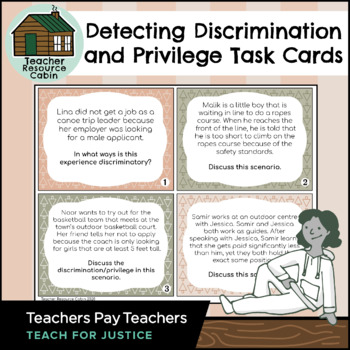- PDF
Description
This task card pack contains 20 cards to help students learn to detect discrimination and privilege in real-life scenarios in outdoor settings. In small groups or partners, students can discuss the scenarios on each card.
This resource also includes an "Answer Key to Facilitate Conversation" with discussion points for working through these cards with your students.
Discrimination is when someone is unfairly treated because of some aspect of their identity.
Privilege is a special right, advantage, or immunity granted or available only to a particular person or group.
It is important for students to understand that discrimination and privileges exist in outdoor spaces. Until Black, Indigenous, and People of Color (BIPOC) feel safe and welcome outside, the outdoors are not a space of enjoyment for all.
Using this resource:
- Individually: Students can read through the card and think about how they would respond in each scenario and write a response in their journals
- In partners: With a friend, students can take turns reading the cards to each other and sharing their responses.
- Small-group: Students can take turns reading the card. When a student has an idea for how they would respond, they can say it
- Large-group: The teacher can read the card and students can raise their hands to give a response.
Choose the group size that is appropriate for your class. Consider that some students may feel most comfortable thinking about these cards individually or in partners. If you have set up a very safe and welcoming classroom community, students may feel comfortable sharing with the whole group. Even still, you may want to give an opportunity for students to read through these cards in smaller groups prior to sharing with the whole class.
Follow-up questions to use with the whole class:
- What incidents of discrimination have you seen on the media or in your life?
- Those who are disadvantaged by privilege are often afraid or not willing to speak out about it. Why do you think this is the case? Explain your reasoning.
Please see our Terms of Use, which are included in the product and available on our TPT store.
©Copyright Teacher Resource Cabin 2020





